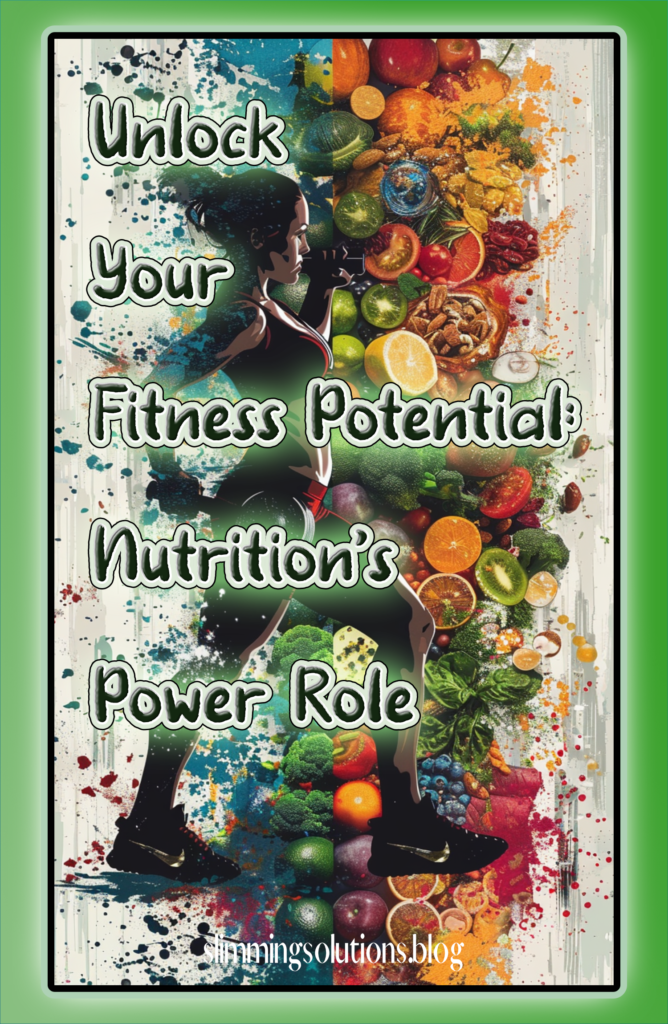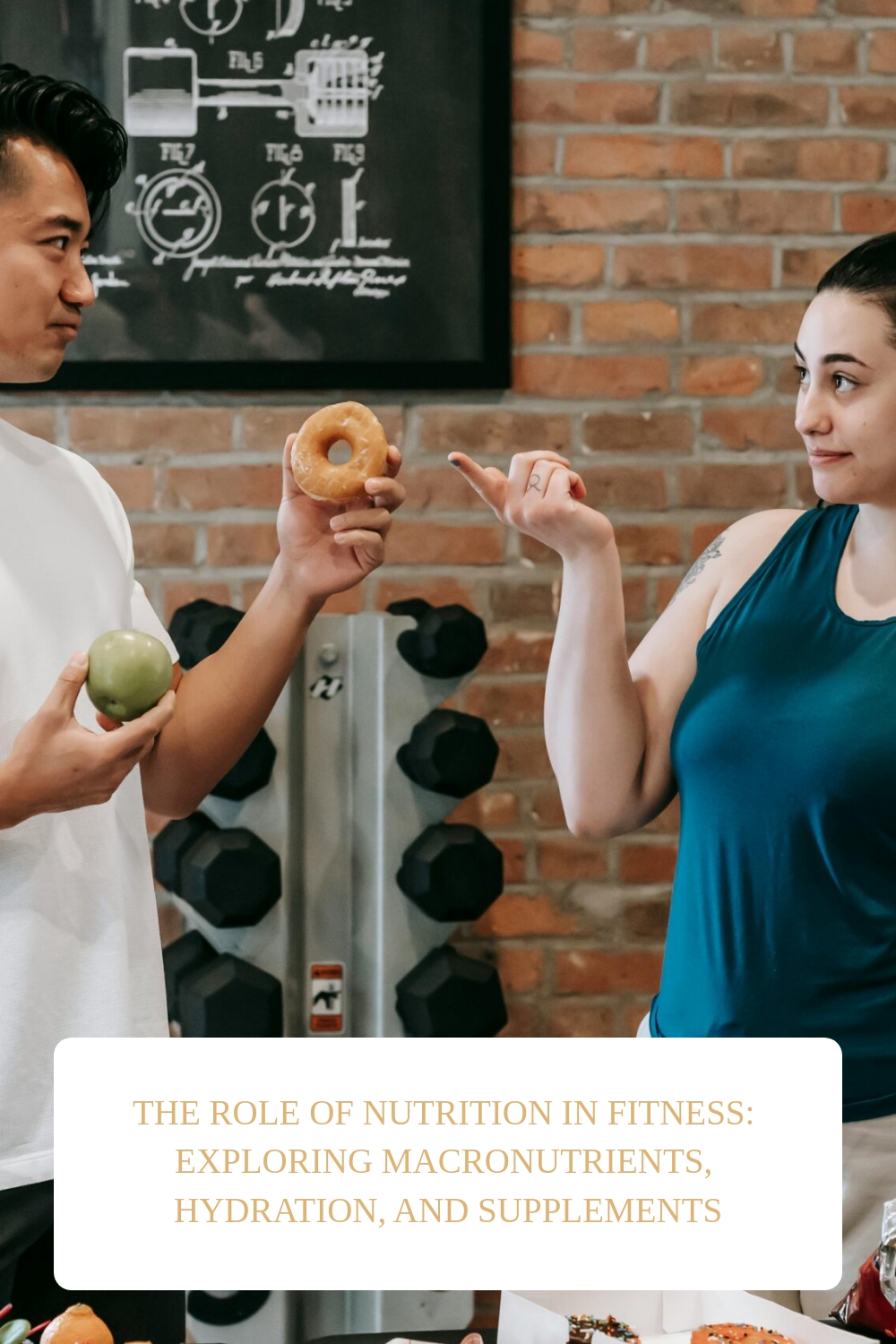
Table of Contents
Table of Contents
Introduction
- Understanding the Role of Nutrition in Fitness
Fundamentals of Nutrition and Fitness
- Explaining the Interplay Between Nutrition and Fitness Performance
- Macronutrients and Fitness: Roles and Sources
- The Importance of Hydration in Exercise
The Role of Macronutrients
- Carbohydrates: Fueling High-Intensity Exercise
- Proteins: Building and Repairing Muscle Tissue
- Fats: Supporting Overall Health and Hormone Production
Hydration and Exercise
- The Science of Staying Hydrated
- Practical Tips for Maintaining Hydration
Pre- and Post-Workout Nutrition
- Optimizing Performance and Recovery
- Meal and Snack Ideas
Dietary Strategies for Fitness Goals
- Specific Diets and Their Impact on Fitness
- Nutrition for Achieving Six-Pack Abs
- Adjusting Your Diet: Weight Loss vs. Muscle Gain vs. Endurance
Lifestyle Considerations
- The Impact of Sleep and Stress Management on Fitness
Supplements and Fitness
- Common Supplements and Their Benefits
- Considerations for Supplement Use
Meal Planning and Preparation
- Strategies for Success
- Sample Meal Plans for Various Fitness Goals
Frequently Asked Questions – Addressing Common Queries on Nutrition and Fitness
If you’re looking to improve your fitness, nutrition plays a crucial role. The food you eat provides the fuel your body needs to perform at its best, whether you’re aiming to lose weight, build muscle, or improve endurance. But with so much conflicting information out there, it can be hard to know where to start. Should you try a specific diet? Should you cut out carbs? What supplements should you be taking? These are just a few of the common questions people have when it comes to nutrition and fitness.
To help clear up the confusion, this article will explore the fundamentals of nutrition and fitness, including the roles of macronutrients like carbohydrates, proteins, and fats, as well as the importance of hydration and pre-and post-workout nutrition. We’ll also discuss dietary strategies for different fitness goals, lifestyle considerations like sleep and stress management, and common supplements for fitness. Additionally, we’ll provide tips for meal planning and preparation to help you stay on track with your nutrition goals.
Key Takeaways:
- Nutrition is a crucial component of fitness, providing the fuel your body needs to perform at its best.
- Understanding the role of macronutrients like carbohydrates, proteins, and fats, as well as the importance of hydration and pre- and post-workout nutrition, can help you optimize your fitness performance.
- Adjusting your diet for weight loss, muscle gain, or endurance training, as well as considering lifestyle factors like sleep and stress management, can help you achieve your fitness goals.
Fundamentals of Nutrition and Fitness

Explaining the Interplay Between Nutrition and Fitness Performance
Nutrition and fitness performance are closely interlinked. The food you eat provides the fuel and nutrients necessary to power your workouts and optimize your physical performance. Adequate nutrition is essential for building and repairing muscle tissue, maintaining energy levels, and supporting overall physical health.
On the other hand, regular exercise and physical activity have a significant impact on your nutritional needs. Exercise increases your body’s demand for energy and nutrients, particularly protein, carbohydrates, and fluids. It also affects your metabolism, digestion, and absorption of nutrients.
Macronutrients and Fitness
Macronutrients, including carbohydrates, proteins, and fats, play a critical role in supporting fitness goals. Carbohydrates are the primary source of energy for high-intensity exercise, while proteins are necessary for muscle repair and growth. Fats are essential for hormone production and overall health.
To optimize your macronutrient intake, you should choose nutrient-dense, whole foods that provide a balance of carbohydrates, proteins, and fats. Examples include whole grains, lean proteins, nuts, seeds, and fruits and vegetables.
Hydration and Exercise
Proper hydration is essential for optimal physical performance. Dehydration can lead to fatigue, cramping, and decreased endurance. It is recommended that you drink water before, during, and after exercise to maintain proper hydration levels.
The amount of water you need depends on several factors, including your body weight, exercise intensity, and environmental conditions. As a general guideline, aim to drink at least 8-10 cups of water per day, and increase your intake during exercise.
Pre- and Post-Workout Nutrition
Pre- and post-workout nutrition are critical for optimizing performance and recovery. Before exercise, you should consume a balanced meal that includes carbohydrates, proteins, and fats. This will provide your body with the energy it needs to power through your workout.
After exercise, you should consume a meal or snack that includes protein and carbohydrates to promote muscle repair and glycogen replenishment. Timing is also essential, and you should aim to eat within 30 minutes to an hour after exercise.
In summary, proper nutrition is critical for optimal physical performance. By understanding the interplay between nutrition and fitness, choosing nutrient-dense whole foods, staying hydrated, and timing your meals around your workouts, you can optimize your fitness goals and achieve optimal health.
Dietary Strategies for Fitness Goals

When it comes to nutrition and fitness, many people wonder if they should try a specific diet to achieve their goals. While there is no one-size-fits-all approach, certain diets may be more beneficial for specific fitness goals. For example, a high-protein diet may be ideal for those looking to build muscle, while a low-carb diet may be effective for weight loss.
Specific Diets and Fitness
Some popular diets that individuals may consider for fitness goals include the ketogenic diet, paleo diet, and intermittent fasting. These diets can be effective for weight loss, muscle gain, and overall health, but it’s important to consult with a healthcare professional before starting any new diet.
Carbohydrates and Fitness
Carbohydrates are an important macronutrient for energy during exercise, but understanding the impact of carbohydrates on fitness and whether eliminating them is beneficial is a common query among those focusing on nutrition for fitness. While low-carb diets may be effective for weight loss, they may not be ideal for high-intensity exercise. It’s important to find a balance that works for your fitness goals and lifestyle.
Achieving 6-Pack Abs
Many people inquire about the nutritional strategies to achieve defined abdominal muscles, a common fitness goal. While a healthy diet is important for overall body composition, targeted exercises and a caloric deficit may be necessary to achieve six-pack abs. Incorporating protein-rich foods, healthy fats, and fiber can also support a healthy digestive system and help reduce inflammation, which can contribute to abdominal bloating.
Nutrition Strategies for Different Fitness Goals
Adjusting your diet for weight loss, muscle gain, or endurance training requires a different approach to macronutrient and calorie intake. For weight loss, a calorie deficit is necessary, while muscle gain requires a calorie surplus and adequate protein intake. Endurance training may require a higher carbohydrate intake to support energy needs during long workouts.
In conclusion, there is no one-size-fits-all approach to nutrition for fitness goals. It’s important to find a balance that works for your individual needs and lifestyle. Incorporating a variety of nutrient-dense foods, staying hydrated, and timing your meals around workouts can all support your fitness goals.
Lifestyle Considerations

Importance of Sleep and Stress Management
When it comes to nutrition and fitness, it’s important to remember that a healthy lifestyle is not just about what you eat and how you exercise. Adequate sleep and stress management are key components of overall well-being and can significantly impact your fitness goals.
Lack of sleep can lead to decreased energy levels, reduced cognitive function, and impaired physical performance. Additionally, chronic stress can lead to increased inflammation in the body, which can negatively affect recovery and muscle growth.
To ensure that you are getting enough sleep, aim for 7-9 hours of uninterrupted sleep each night. Establishing a consistent sleep schedule and creating a relaxing bedtime routine can also help improve sleep quality.
Managing stress can be challenging, but there are several strategies that can help. Regular exercise, meditation, deep breathing exercises, and spending time in nature are all effective ways to reduce stress levels. Additionally, prioritizing self-care activities such as reading, taking a bath, or spending time with loved ones can also help reduce stress.
Incorporating these lifestyle considerations into your fitness routine can help you achieve your goals while promoting overall health and well-being.
Supplements and Fitness

Supplements can be a useful addition to a balanced diet and fitness routine. However, it is important to understand that they are not a replacement for whole foods and should not be relied on as the sole source of nutrients. Below are some common supplements used by fitness enthusiasts and their benefits.
Common Supplements for Fitness
- Protein Powder: Protein is essential for muscle growth and repair. Protein powder is a convenient way to increase your protein intake, especially for those who struggle to consume enough protein through whole foods. Whey protein is the most popular type of protein powder and has been shown to increase muscle mass and strength when combined with resistance training. Other types of protein powder include casein, soy, and pea protein.
- Creatine: Creatine is a naturally occurring substance in the body that helps produce energy during high-intensity exercise. Supplementing with creatine has been shown to increase muscle mass, strength, and exercise performance. It is important to note that creatine can cause water retention, so it is essential to stay hydrated when taking this supplement.
- Caffeine: Caffeine is a stimulant that can increase energy, focus, and exercise performance. It has also been shown to increase fat burning during exercise. However, it is important to be mindful of your caffeine intake, as too much can cause jitters, anxiety, and sleep disturbances.
Considerations and Cautions When Using Supplements
- Quality: Not all supplements are created equal. Look for supplements that have been third-party tested for purity and potency. Choose reputable brands and avoid supplements that make exaggerated or false claims.
- Dosage: Follow the recommended dosage on the supplement label. Taking too much of a supplement can be harmful and may cause adverse effects.
- Interactions: Some supplements can interact with medications or other supplements. Consult with a healthcare professional before taking any new supplements, especially if you have a medical condition or are taking medication.
In conclusion, supplements can be a useful addition to a balanced diet and fitness routine. However, it is important to choose high-quality supplements, follow recommended dosages, and be mindful of potential interactions. Remember that whole foods should always be the foundation of your nutrition plan.
Meal Planning and Preparation

Meal planning and preparation are essential components of a healthy and active lifestyle. Proper nutrition is crucial for achieving your fitness goals, and meal planning helps ensure that you are consuming the right foods in the right amounts. By taking the time to plan and prepare your meals, you can save time, money, and energy, and avoid making unhealthy food choices.
Tips for Meal Planning and Preparation
Here are some tips to help you get started with meal planning and preparation:
- Plan your meals in advance: Take some time each week to plan out your meals for the upcoming week. This will help you stay on track with your nutrition goals and avoid making impulsive food choices.
- Make a grocery list: Once you have planned out your meals, make a list of the ingredients you will need to purchase. This will help you avoid buying unnecessary items and save you time and money.
- Prep your meals in advance: Spend some time each week prepping your meals in advance. This could include chopping vegetables, cooking grains, or marinating meats. By doing this, you can save time during the week and ensure that you have healthy meals ready to go.
- Use a slow cooker: A slow cooker is a great tool for meal preparation. You can easily prepare large batches of healthy meals, such as stews, soups, and chili, and have them ready to go for the week.
- Use healthy cooking methods: When preparing your meals, use healthy cooking methods such as baking, grilling, or steaming. Avoid frying or using excessive amounts of oil.
Sample Meal Plans for Fitness Enthusiasts
Here are some sample meal plans for fitness enthusiasts:
Meal Plan 1: Weight Loss
- Breakfast: Greek yogurt with berries and granola
- Snack: Apple slices with almond butter
- Lunch: Grilled chicken salad with mixed greens, tomatoes, and avocado
- Snack: Carrots and hummus
- Dinner: Baked salmon with roasted vegetables
Meal Plan 2: Muscle Gain
- Breakfast: Omelet with spinach, mushrooms, and cheese
- Snack: Protein shake with banana and almond milk
- Lunch: Grilled chicken breast with sweet potato and green beans
- Snack: Greek yogurt with granola and honey
- Dinner: Beef stir-fry with brown rice and broccoli
Meal Plan 3: Endurance Training
- Breakfast: Oatmeal with berries and almond butter
- Snack: Trail mix with nuts and dried fruit
- Lunch: Quinoa salad with roasted vegetables and grilled chicken
- Snack: Protein bar
- Dinner: Whole wheat pasta with tomato sauce and turkey meatballs
Remember, meal planning and preparation are key components of a healthy and active lifestyle. By taking the time to plan and prepare your meals, you can ensure that you are consuming the right foods in the right amounts, and stay on track with your fitness goals.
Frequently Asked Questions

What specific dietary approaches best support fitness goals?
There is no one-size-fits-all answer to this question, as dietary needs and preferences vary from person to person. However, sustainable and enjoyable nutrition habits are key to reaching your goals. It can be tempting to follow a fad diet or social media trend, but frequently these diets are restrictive and unsustainable. Instead, it is recommended to focus on consuming a balanced diet that includes a variety of nutrient-dense foods such as whole grains, lean proteins, healthy fats, and plenty of fruits and vegetables. If you have questions or concerns or want individualized nutrition recommendations, seek advice from a registered dietitian.
What nutritional strategies contribute to achieving defined abdominal muscles?
While exercise is important for developing abdominal muscles, nutrition also plays a crucial role. Consuming a balanced diet that includes adequate amounts of protein, healthy fats, and complex carbohydrates can help support muscle development. Additionally, reducing overall body fat through a combination of proper nutrition and exercise can help increase the visibility of abdominal muscles. However, it is important to keep in mind that spot reduction of fat in specific areas is not possible, and overall weight loss is necessary for reducing abdominal fat.
What is the impact of carbohydrates on fitness, and is eliminating them beneficial?
Carbohydrates are a crucial source of energy for the body, especially during exercise. While low-carbohydrate diets may result in short-term weight loss, they can also lead to decreased energy levels and impaired athletic performance. Instead of eliminating carbohydrates entirely, focus on consuming complex carbohydrates such as whole grains, fruits, and vegetables, which provide sustained energy throughout the day. It is important to remember that individual carbohydrate needs vary based on activity level, body composition, and other factors, so consult with a registered dietitian to determine the appropriate amount of carbohydrates for your needs.
How do sleep and stress management affect nutrition and fitness?
Adequate sleep and stress management are essential for overall health and well-being, including in relation to fitness and nutrition. Poor sleep and high stress levels can disrupt hormonal balance, leading to increased appetite, decreased energy levels, and decreased motivation for exercise. Additionally, stress can lead to emotional eating and poor food choices. Prioritizing adequate sleep and stress management techniques such as mindfulness, meditation, and regular exercise can help support overall health and fitness goals.
Which supplements are beneficial for fitness goals and overall health?
Supplements can be useful for supporting fitness goals, but it is important to remember that they should not replace a balanced diet. Some common supplements used by fitness enthusiasts include protein powders, creatine, and caffeine. However, it is important to consult with a healthcare professional before starting any supplement regimen, as some supplements can have negative interactions with medications or pre-existing health conditions.
How should I adjust my diet for different fitness goals such as weight loss, muscle gain, or endurance training?
Different fitness goals require different nutritional strategies. For weight loss, it is important to consume a calorie deficit while still maintaining adequate nutrient intake. For muscle gain, focus on consuming adequate amounts of protein and complex carbohydrates to support muscle development. For endurance training, consuming adequate amounts of carbohydrates can help support sustained energy levels during exercise. Consulting with a registered dietitian can help determine the appropriate nutritional strategies for your specific fitness goals.


